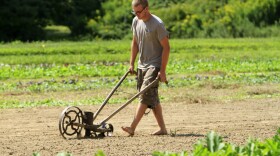Dan Charles
-
The grass pea is one: a hardy crop that can thrive in a drought. An agriculturist is spearheading an effort to diversify what farmers grow as climate change threatens staples like corn and wheat.
-
The act of providing food aid to countries in need turns out to be a complicated and controversial matter. Here's why.
-
Tons of green energy projects, both wind and solar, want to connect to the grid. But they're running into a surprising obstacle.
-
For years, powerful farmers in California's Central Valley fought for more water from the state's rivers. Now some are changing course, because there's no more water to be found.
-
Reformist farmers in California have deposed the leader of the country's biggest irrigation district, who was known for fighting water regulations. Farmers are accepting less water means less farming.
-
A promising, less labor-intensive perennial rice is beginning to take off in China, but whether this success can be replicated in other crops like wheat or corn remains to be seen.
-
The honey on supermarket shelves is probably real honey, after all. But claims that illicit Chinese honey was being sneaked into the U.S. market reveal how quick we are to assume the worst about supermarket foods — and imports. Closer analysis reveals a more complex tale.
-
Growing vegetables has never, in recent memory, been quite so cool, or so attractive to the young and well-educated. But many aspiring farmers lack hard, cold cash for land and farm equipment, a survey found.
-
American consumers like their honey bright and clear, but removing the pollen makes it hard to trace honey back to its source. A new report says three quarters of honey sold in the U.S. doesn't contain any pollen.
-
An economist's career was shaped by the food shortages of the 1970s. The rice crisis of 2008, and continuing high food prices around the world, brought him out of semi-retirement. Today, he's busier than ever.








